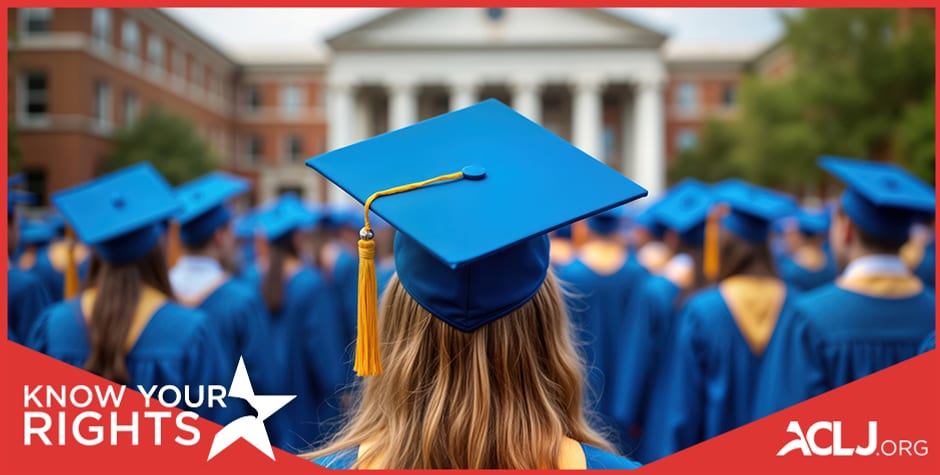Know Your Rights: Public Schools Cannot Restrict Student Prayer or Religious Expression at Graduations
Listen tothis article
Consider this: You raise an amazing, hardworking child who excels in school, is involved in numerous honorable school clubs, and is an accomplished athlete. Your child is also a strong Christian and understands the importance of prayer. As a result of this exemplary public school record, your child is the valedictorian and is asked to speak at graduation.
What an amazing honor! But wait, not so fast. The public school then informs your child that neither prayer nor anything religious may be expressed in your child’s graduation speech as the school does not want to “promote religion.” Your child is devastated.
As unfortunate as this is, public schools often (wrongly) restrict students’ private religious expression. To offer some clarity, the ACLJ has written a legal memo that provides a general overview of the law with respect to such questions as the permissibility of student prayer by a valedictorian or salutatorian at a public school graduation and the permissibility of the use of a public school facility for a religious baccalaureate ceremony.
First, our memo discusses the first three clauses of the First Amendment, generally referred to as the Establishment Clause, the Free Exercise Clause, and the Free Speech Clause. In a nutshell, the Establishment Clause “prohibits the government from unduly preferring religion over non-religion, or non-religion over religion.” The Free Exercise Clause “prohibits government from regulating, prohibiting, or rewarding religious beliefs.” And the Free Speech Clause “prohibits the government from suppressing or forcing conformity with particular ideas or messages.”
Our memo next addresses “Prayer at Graduation” and “Baccalaureate Ceremonies” questions, as explained in the U.S. Department of Education’s Guidance on Constitutionally Protected Prayer and Religious Expression in Public Elementary and Secondary Schools. Per this Guidance with respect to prayer at graduation, our memo points out:
Where students or other private graduation speakers are selected on the basis of genuinely content-neutral, evenhanded criteria, and schools do not determine or have control over their speech, . . . that expression . . . may not be restricted because of its religious content (or content opposing religion) and may include prayer. (Emphasis added.)
The key is that such “expression is not attributable to the school.”
With respect to the permissibility of the use of a public school facility for a religious baccalaureate ceremony, per the Guidance and as reflected in our memo: “[I]f a school makes its facilities and related services available to other private groups, it must make its facilities and services available on the same terms to organizers of privately sponsored religious baccalaureate ceremonies.” Keep in mind that this Guidance serves as a helpful resource for other religious-related questions as well.
The remainder of our memo focuses on the U.S. Supreme Court’s First Amendment analysis in Kennedy v. Bremerton Sch. Dist., 597 U.S. 507 (2022), a case about Joseph Kennedy, a high school football coach who lost his job “because he knelt at midfield after games to offer a quiet prayer of thanks.” The Supreme Court’s First Amendment application from Kennedy is also applicable in the graduation setting:
Both the Free Exercise and Free Speech Clauses of the First Amendment protect expressions like Mr. Kennedy’s. Nor does a proper understanding of the Amendment’s Establishment Clause require the government to single out private religious speech for special disfavor. The Constitution and the best of our traditions counsel mutual respect and tolerance, not censorship and suppression, for religious and nonreligious views alike.
As the Supreme Court emphasized in Kennedy: “Respect for religious expressions is indispensable to life in a free and diverse Republic—whether those expressions take place in a sanctuary or on a field, and whether they manifest through the spoken word or a bowed head.”
In conclusion, it is important to remember that First Amendment legal cases involving religious questions are often very fact-specific. Our memo, along with its discussion of the First Amendment, the federal Guidance, and the Kennedy case, is intended to provide a better understanding of these issues. That said, the ACLJ always stands ready to assist when issues arise concerning religious expression in the public school setting.
We have been providing assistance and legal representation, at no cost or charge, to people just like you for decades. If your rights are being violated in this area, please contact us at ACLJ.org/HELP.
Learn more about your constitutional rights at ACLJ.org/Know-Your-Rights.
